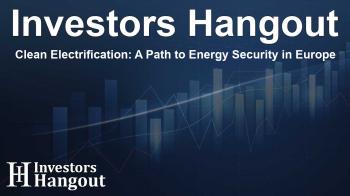Clean Electrification: A Path to Energy Security in Europe

Europe's Energy Security Strategy Unveiled
Europe faces unprecedented energy challenges. Recent events such as cable sabotage in the Baltic, severe storms dimming power in certain regions, ongoing conflicts in Eastern Europe, and tumultuous fuel prices have placed enormous stress on the continent's energy systems. With plans for significant decarbonization, Europe is transitioning to clean and renewable energy sources, which are expected to meet 60% of final energy use by 2050.
Fundamental Changes in Energy Supply
The current energy security strategy, adopted nearly a decade ago, is no longer fit for today's landscape. As reliance on imported energy has increased, reshaping the approach becomes crucial. Projections indicate a decline in energy imports from 60% of the EU supply in 2022 down to approximately 13% by 2050. This transformation is largely attributable to the electrification of transport and heating, with renewable energy production fully integrated into the mix.
Renewable Energy's Promising Forecast
By 2030, renewable energy is anticipated to account for 69% of total power generated in Europe, marking a significant shift away from traditional energy sources. This transition necessitates an integrated approach to energy security, emphasizing the importance of clean electrification as a superior framework for reducing dependency on imported fuels and mitigating price volatility.
Urgency for Revised Energy Policies
Eurelectric's President and E.ON CEO, Leonhard Birnbaum, has highlighted the pressing need for policymakers to recognize the evolving energy landscape. He emphasizes, "The recent year has shown us that business-as-usual in Europe is no longer an option. With the threats faced by our sector, security of supply is becoming an urgent priority that policymakers and regulators must acknowledge." Addressing this issue requires a framework built on three pillars.
Strengthening the Foundations of Energy Security
The recently released study proposes that Europe fortify its energy infrastructure through meticulous planning, flexibility, and functional markets. By ensuring that preparedness frameworks cover the entire energy value chain, all vectors, and long-term timeframes, Europe will be better equipped to identify its energy needs in facing external challenges.
The Role of Flexibility in Energy Management
Moreover, to accommodate the increasing use of variable renewable sources, a tremendous boost in flexible capacity is vital. The study recommends that 175 GW of flexible capacity should be derived from innovations in energy storage technologies and demand-side response by 2030. Establishing viability for investments in these areas through capacity mechanisms is essential for future stability.
Rethinking Market Mechanisms
Effective market mechanisms are also crucial. By implementing price signals that closely correspond with system demands, consumers can play a significant role in security supply. This adaptation allows for the adjustment of energy use during times of high demand, enhancing overall resilience.
Birnbaum concluded with a call to action, stating, "This is not going to be an easy endeavor. Let's ensure Europe has the right vision to achieve this." The public unveiling of the detailed study will take place at an upcoming prominent security conference, setting the stage for impactful discussions on Europe's energy future.
Frequently Asked Questions
What are the main challenges facing Europe's energy security?
Europe's energy security is threatened by geopolitical tensions, climate change, supply chain disruptions, and increasing volatile energy prices.
How much of Europe's energy is expected to come from renewables by 2030?
Renewable energy is projected to generate 69% of Europe's power by 2030, significantly shifting the energy landscape.
What are the suggested pillars for enhancing energy security?
The study suggests focusing on better planning, flexibility in energy systems, and creating functioning markets to adapt to energy needs.
Why is electrification important for Europe's energy strategy?
Electrification reduces reliance on imported fuels, helps mitigate price fluctuations, and supports the transition to a greener economy.
When will the detailed study on Europe's energy security be released?
The study will be formally unveiled at an upcoming security conference in Munich, where key stakeholders will discuss its implications.
About The Author
Contact Riley Hayes privately here. Or send an email with ATTN: Riley Hayes as the subject to contact@investorshangout.com.
About Investors Hangout
Investors Hangout is a leading online stock forum for financial discussion and learning, offering a wide range of free tools and resources. It draws in traders of all levels, who exchange market knowledge, investigate trading tactics, and keep an eye on industry developments in real time. Featuring financial articles, stock message boards, quotes, charts, company profiles, and live news updates. Through cooperative learning and a wealth of informational resources, it helps users from novices creating their first portfolios to experts honing their techniques. Join Investors Hangout today: https://investorshangout.com/
The content of this article is based on factual, publicly available information and does not represent legal, financial, or investment advice. Investors Hangout does not offer financial advice, and the author is not a licensed financial advisor. Consult a qualified advisor before making any financial or investment decisions based on this article. This article should not be considered advice to purchase, sell, or hold any securities or other investments. If any of the material provided here is inaccurate, please contact us for corrections.

